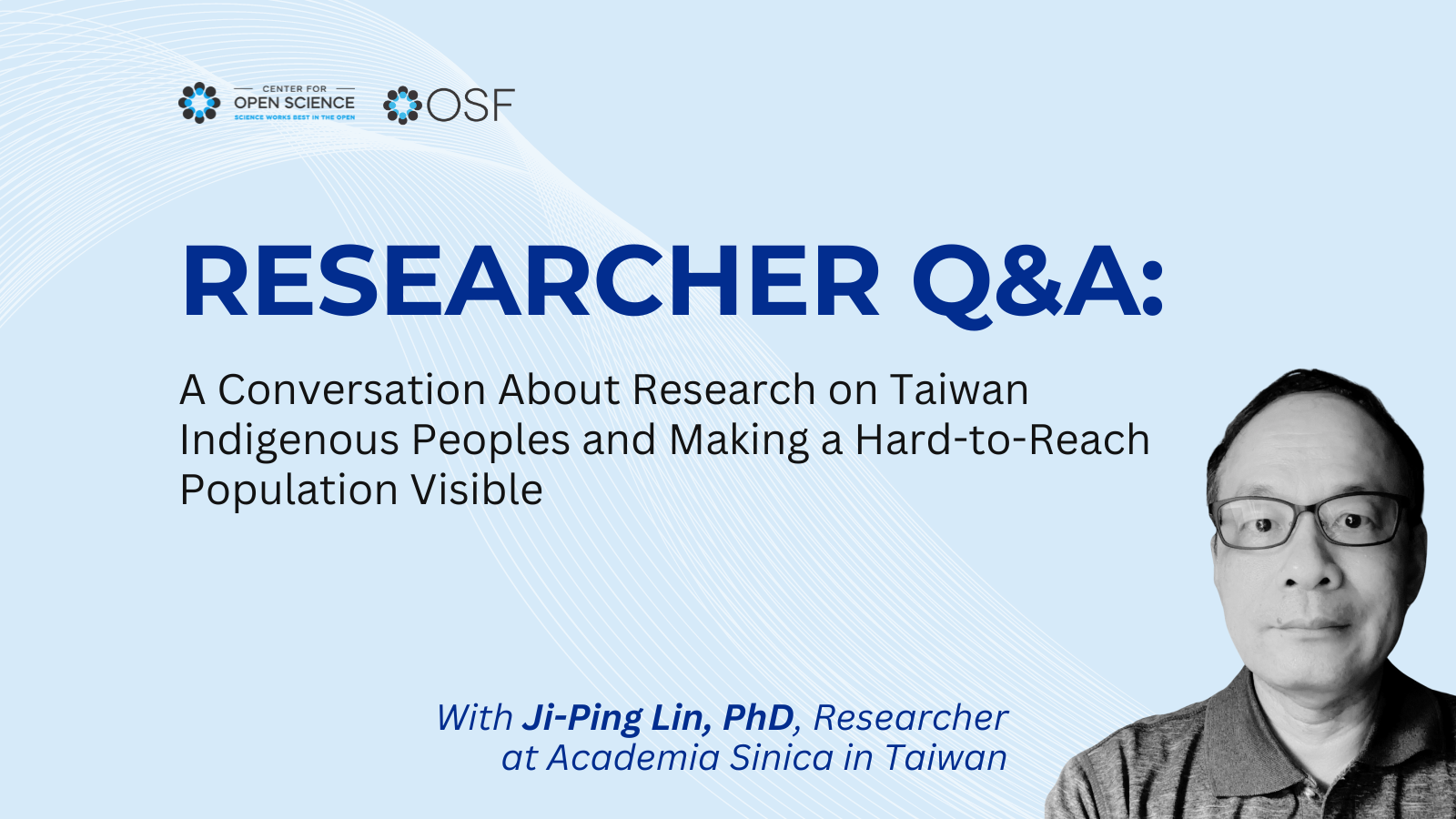
Ji-Ping Lin, PhD, is a researcher at Academia Sinica in Taiwan who created an open access dataset to facilitate research and understanding of Taiwan Indigenous Peoples. In this Q&A, Lin answers questions about the project, including his use of the Open Science Framework (OSF) and the wide-ranging impact of his research.
Q. What inspired you to pursue this research project?
A. Taiwan Indigenous Peoples (TIPs) are a branch of Polynesian-Malaysian (or Austronesian) ethnic groups in a genetic and linguistic context. There was a rich body of ethnographic, official, and academic records on TIPs before 1940. However, the period of 1940–2000 was a data “Dark Ages” for TIPs due to political reasons. This lack of data marginalized them, making it seem like they were disappearing. In 2000, Taiwan resumed its general population census, and I participated and delved into the indigenous data.
Ten years later, with no new census, Taiwan's Council for Indigenous Affairs asked for help conducting in-depth research. They needed evidence to inform their policies. We agreed to collect monthly data of household register and store it securely using data science and open science. I faced challenges protecting privacy while accessing individual data, but I discovered breakthroughs in computing that allowed detailed data analysis without revealing personal information.
Seeing this success, I wondered why not share the data publicly? Sharing data typically requires costly data servers, but I found the OSF. In 2014, the OSF was still in its early stages. When I started using it, I identified several areas for improvement. I collaborated with the OSF team, providing feedback on these issues, and they were always responsive. In early 2015, I officially uploaded and regularly updated my entire Taiwan Indigenous Peoples Open Research Data (TIPD) open dataset to OSF. I'm impressed by how much OSF has grown in less than a decade.
Q. What is included in the TIPD archive?
A. As of June 2024, TIPD holds over 14,000 digital open datasets enriched from household register repositories from 2007 to 2022. From 2013–2017, we focused on building a robust infrastructure and automated system to integrate diverse data sources. From 2018–2024, the focus was on enhancing data quality and increasing variety. The most valuable TIPD archives are those related to population dynamics and indigenous communities. These provide detailed information on population trends, community evolution, and interactions between groups.
Q. How has the data from your research been used?
A. Before this data, we knew indigenous people in Taiwan had a lower life expectancy, but we lacked detailed information on differences between ethnic groups, genders, and ages. Our TIPD population dynamic data is a breakthrough. It's the first of its kind and allows us to study micro-level population changes, including three interrelated dynamics of birth, death, and migration. This helps government and academia develop effective policies. TIPD also provides essential basic information, enabling more accurate population projections and tailored policies.
My expectation about the potential applications for research on TIPs based on TIPD is coming true, including studies on birth, death, migration, residential mobility, marriage, aging, education, medical care, labor, family, and community. TIPD is being used as background data for survey research, including for population analysis, sampling design, and sampling planning.
Our numerical database of these communities has been accessed millions of times on OSF. This data is boosting tourism and improving life for Indigenous people. Thanks to this open data, Indigenous people are no longer invisible. The government is paying more attention, and there's a growing understanding of their challenges. Open data and science have played a crucial role in this progress.
Q. Which OSF features do you rely on the most?
A. The most valuable OSF feature for me is the ability to integrate with Google Drive and Dropbox. Since my dataset is large, I rely on these integrations to manage my files. Users can easily download data from my OSF project by accessing it through Google Drive or Dropbox.
Q. What are the next steps for your research?
A. The Council for Indigenous Affairs and Taiwan's National Science and Technology Council have supported my research for ten years, and the work continues. I recently submitted a new project to expand the TIPD data from 2022 into the future and to delve deeper into historical data, going back to 1980. I also aim to promote technology transfer by sharing my code. While I've already opened the data, I'll be releasing my code soon to fully embrace open science.
Q. Are other researchers in Taiwan receptive to open science practices and OSF?
A. From 2014 to 2018, there was little interest in the OSF among Taiwanese scholars. Now, it's become a crucial platform for academic research. Many colleagues who initially doubted the value of open science and data have changed their minds after seeing the impact of TIPD and OSF.
OSF's support for bilingualism is essential. I post content in both Traditional Chinese and English. OSF has gained significant traction in Taiwan, and I'm no longer alone in advocating for its importance. It's gratifying to see growing recognition of OSF's contributions to the global academic community.
Need a platform to streamline your open research project? Explore OSF.

210 Ridge McIntire Road
Suite 500
Charlottesville, VA 22903-5083
Email: contact@cos.io

Unless otherwise noted, this site is licensed under a Creative Commons Attribution 4.0 International (CC BY 4.0) License.
Responsible stewards of your support
COS has earned top recognition from Charity Navigator and Candid (formerly GuideStar) for our financial transparency and accountability to our mission. COS and the OSF were also awarded SOC2 accreditation in 2023 after an independent assessment of our security and procedures by the American Institute of CPAs (AICPA).
We invite all of our sponsors, partners, and members of the community to learn more about how our organization operates, our impact, our financial performance, and our nonprofit status.